Risky business: the neuroeconomics of decision making under uncertainty
Many decisions involve uncertainty, or imperfect knowledge about how choices lead to outcomes. Colloquial notions of uncertainty, particularly when describing a decision as 'risky', often carry connotations of potential danger as well. Gambling on a long shot, whether a horse at the racetrack or a foreign oil company in a hedge fund, can have negative consequences, but the impact of uncertainty on decision making extends beyond gambling. Indeed, uncertainty in some form pervades nearly all our choices in daily life. Stepping into traffic to hail a cab, braving an ice storm to be the first at work, or dating the boss's son or daughter also offer potentially great windfalls, at the expense of surety. We continually face trade-offs between options that promise safety and others that offer an uncertain potential for jackpot or bust. When mechanisms for dealing with uncertain outcomes fail, as in mental disorders such as problem gambling or addiction, the results can be disastrous. Thus, understanding decision making—indeed, understanding behavior itself—requires knowing how the brain responds to and uses information about uncertainty.
This is a preview of subscription content, access via your institution
Access options
Subscribe to this journal
Receive 12 print issues and online access
206,07 € per year
only 17,17 € per issue
Buy this article
- Purchase on SpringerLink
- Instant access to full article PDF
Prices may be subject to local taxes which are calculated during checkout
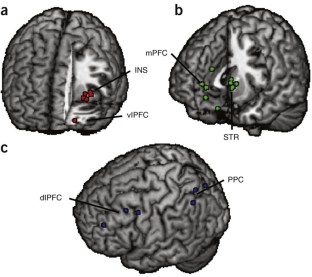
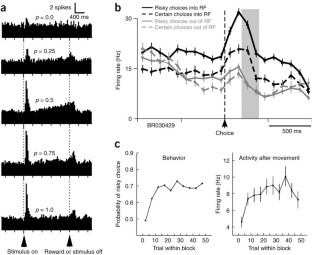
Similar content being viewed by others
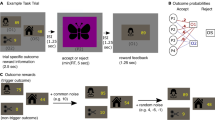
Heuristics in risky decision-making relate to preferential representation of information
Article Open access 20 May 2024
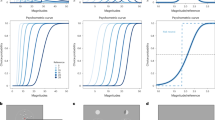
Individual risk attitudes arise from noise in neurocognitive magnitude representations
Article 17 July 2023
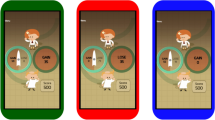
Risk taking for potential losses but not gains increases with time of day
Article Open access 04 April 2023
References
- Bernoulli, D. Specimen theoriae novae de mensura sortis. Commentarii Academiae Scientarum Imperialis Petropolitanae5, 175–192 (1738). Google Scholar
- Samuelson, P.A. Consumption theory in terms of revealed preference. Economica15, 243–253 (1948). ArticleGoogle Scholar
- Camerer, C.F. Prospect theory in the wild: evidence from the field. in Choices, Values, and Frames (eds. Kahneman, D. & Tversky, A.) 288–300 (Cambridge Univ. Press, Cambridge, UK, 1981). Google Scholar
- Post, T., van den Assem, M., Baltussen, G. & Thaler, R.H. Deal or no deal? Decision making under risk in a large-payoff game show. Am. Econ. Rev. (in the press).
- Knight, F.H. Risk, Uncertainty, and Profit (Houghton Mifflin, New York, 1921). Google Scholar
- Ellsberg, D. Risk, ambiguity, and the Savage axioms. Q. J. Econ.75, 643–669 (1961). ArticleGoogle Scholar
- Kahneman, D. & Tversky, A. Prospect theory: an analysis of decision under risk. Econometrica47, 263–291 (1979). ArticleGoogle Scholar
- Tversky, A. & Kahneman, D. Advances in prospect theory: cumulative representation of uncertainty. J. Risk Uncertain.5, 297–323 (1992). ArticleGoogle Scholar
- Camerer, C. & Weber, M. Recent developments in modeling preferences: uncertainty and ambiguity. J. Risk Uncertain.5, 325–370 (1992). ArticleGoogle Scholar
- Ghirardato, P., Maccheroni, F. & Marinacci, M. Differentiating ambiguity and ambiguity attitude. J. Econ. Theory118, 133–173 (2004). ArticleGoogle Scholar
- Tversky, A. & Fox, C.R. Weighing risk and uncertainty. Psychol. Rev.102, 269–283 (1995). ArticleGoogle Scholar
- MacCrimmon, K.R. & Wehrung, D.A. Taking Risks: The Management of Uncertainty (Free Press, New York, 1986). Google Scholar
- Slovic, P. Assessment of risk taking behavior. Psychol. Bull.61, 220–233 (1964). ArticleCASPubMedGoogle Scholar
- Weber, E.U., Blais, A.R. & Betz, E. A domain specific risk-attitude scale: measuring risk perceptions and risk behaviors. J. Behav. Decis. Making15, 263–290 (2002). ArticleGoogle Scholar
- Hsee, C.K. & Weber, E.U. Cross-national differences in risk preference and lay predictions. J. Behav. Decis. Making12, 165–179 (1999). ArticleGoogle Scholar
- Bontempo, R.N., Bottom, W.P. & Weber, E.U. Cross-cultural differences in risk perception: a model-based approach. Risk Anal.17, 479–488 (1997). ArticleGoogle Scholar
- Kacelnik, A. & Bateson, M. Risky theories—the effects of variance on foraging decisions. Am. Zool.36, 402–434 (1996). ArticleGoogle Scholar
- Stephens, D.W. & Krebs, J.R. Foraging Theory (Princeton Univ. Press, Princeton, New Jersey, USA, 1986). Google Scholar
- Caraco, T. Energy budgets, risk and foraging preferences in dark-eyed juncos (Junco hyemalis). Behav. Ecol. Sociobiol.8, 213–217 (1981). ArticleGoogle Scholar
- Gilby, I.C. & Wrangham, R.W. Risk-prone hunting by chimpanzees (Pan troglodytes schweinfurthii) increases during periods of high diet quality. Behav. Ecol. Sociobiol.61, 1771–1779 (2007). ArticleGoogle Scholar
- Kacelnik, A. Normative and descriptive models of decision making: time discounting and risk sensitivity. Ciba Found. Symp.208, 51–67 discussion 208, 67–70 (1997). CASPubMedGoogle Scholar
- Bateson, M. & Kacelnik, A. Starlings' preferences for predictable and unpredictable delays to food. Anim. Behav.53, 1129–1142 (1997). ArticleCASPubMedGoogle Scholar
- Mazur, J.E. An adjusting procedure for studying delayed reinforcement. in The Effect of Delay and of Intervening Events on Reinforcement Value (eds. Commons, M., Mazur, J., Nevin, J. & Rachlin, H.) 55–73 (Erlbaum, Hillsdale, New Jersey, USA, 1987). Google Scholar
- Gibbon, J. Scalar expectancy theory and Weber's law in animal timing. Psychol. Rev.84, 279–335 (1977). ArticleGoogle Scholar
- McNamara, J.M. & Houston, A.I. The common currency for behavioral decisions. Am. Nat.127, 358–378 (1986). ArticleGoogle Scholar
- Kalenscher, T. Decision making: don't risk a delay. Curr. Biol.17, R58–R61 (2007). ArticleCASPubMedGoogle Scholar
- Rachlin, H. The Science of Self-Control (Harvard Univ. Press, Cambridge, Massachusetts, USA, 2000). Google Scholar
- Hayden, B.Y. & Platt, M.L. Temporal discounting predicts risk sensitivity in rhesus macaques. Curr. Biol.17, 49–53 (2007). ArticleCASPubMedPubMed CentralGoogle Scholar
- Volz, K.G., Schubotz, R.I. & von Cramon, D.Y. Predicting events of varying probability: uncertainty investigated by fMRI. Neuroimage19, 271–280 (2003). ArticlePubMedGoogle Scholar
- Volz, K.G., Schubotz, R.I. & von Cramon, D.Y. Why am I unsure? Internal and external attributions of uncertainty dissociated by fMRI. Neuroimage21, 848–857 (2004). ArticlePubMedGoogle Scholar
- Elliott, R. & Dolan, R.J. Activation of different anterior cingulate foci in association with hypothesis testing and response selection. Neuroimage8, 17–29 (1998). ArticleCASPubMedGoogle Scholar
- Schubotz, R.I. & von Cramon, D.Y. A blueprint for target motion: fMRI reveals perceived sequential complexity to modulate premotor cortex. Neuroimage16, 920–935 (2002). ArticlePubMedGoogle Scholar
- Huettel, S.A., Song, A.W. & McCarthy, G. Decisions under uncertainty: probabilistic context influences activity of prefrontal and parietal cortices. J. Neurosci.25, 3304–3311 (2005). ArticleCASPubMedPubMed CentralGoogle Scholar
- Paulus, M.P. et al. Prefrontal, parietal, and temporal cortex networks underlie decision-making in the presence of uncertainty. Neuroimage13, 91–100 (2001). ArticleCASPubMedGoogle Scholar
- Koechlin, E., Ody, C. & Kouneiher, F. The architecture of cognitive control in the human prefrontal cortex. Science302, 1181–1185 (2003). ArticleCASPubMedGoogle Scholar
- Miller, E.K. & Cohen, J.D. An integrative theory of prefrontal cortex function. Annu. Rev. Neurosci.24, 167–202 (2001). ArticleCASPubMedGoogle Scholar
- Bunge, S.A., Hazeltine, E., Scanlon, M.D., Rosen, A.C. & Gabrieli, J.D. Dissociable contributions of prefrontal and parietal cortices to response selection. Neuroimage17, 1562–1571 (2002). ArticlePubMedGoogle Scholar
- Dehaene, S., Piazza, M., Pinel, P. & Cohen, L. Three parietal circuits for number processing. Cogn. Neuropsychol.20, 487–506 (2003). ArticlePubMedGoogle Scholar
- Schultz, W. & Dickinson, A. Neuronal coding of prediction errors. Annu. Rev. Neurosci.23, 473–500 (2000). ArticleCASPubMedGoogle Scholar
- Montague, P.R., Dayan, P. & Sejnowski, T.J. A framework for mesencephalic dopamine systems based on predictive Hebbian learning. J. Neurosci.16, 1936–1947 (1996). ArticleCASPubMedPubMed CentralGoogle Scholar
- Schultz, W., Dayan, P. & Montague, P.R. A neural substrate of prediction and reward. Science275, 1593–1599 (1997). ArticleCASPubMedGoogle Scholar
- Knutson, B., Fong, G.W., Adams, C.M., Varner, J.L. & Hommer, D. Dissociation of reward anticipation and outcome with event-related fMRI. Neuroreport12, 3683–3687 (2001). ArticleCASPubMedGoogle Scholar
- Knutson, B., Taylor, J., Kaufman, M., Peterson, R. & Glover, G. Distributed neural representation of expected value. J. Neurosci.25, 4806–4812 (2005). ArticleCASPubMedPubMed CentralGoogle Scholar
- Berns, G.S., McClure, S.M., Pagnoni, G. & Montague, P.R. Predictability modulates human brain response to reward. J. Neurosci.21, 2793–2798 (2001). ArticleCASPubMedPubMed CentralGoogle Scholar
- McClure, S.M., Berns, G.S. & Montague, P.R. Temporal prediction errors in a passive learning task activate human striatum. Neuron38, 339–346 (2003). ArticleCASPubMedGoogle Scholar
- Delgado, M.R., Nystrom, L.E., Fissell, C., Noll, D.C. & Fiez, J.A. Tracking the hemodynamic responses to reward and punishment in the striatum. J. Neurophysiol.84, 3072–3077 (2000). ArticleCASPubMedGoogle Scholar
- Breiter, H.C., Aharon, I., Kahneman, D., Dale, A. & Shizgal, P. Functional imaging of neural responses to expectancy and experience of monetary gains and losses. Neuron30, 619–639 (2001). ArticleCASPubMedGoogle Scholar
- Azim, E., Mobbs, D., Jo, B., Menon, V. & Reiss, A.L. Sex differences in brain activation elicited by humor. Proc. Natl. Acad. Sci. USA102, 16496–16501 (2005). ArticleCASPubMedPubMed CentralGoogle Scholar
- Aharon, I. et al. Beautiful faces have variable reward value: fMRI and behavioral evidence. Neuron32, 537–551 (2001). ArticleCASPubMedGoogle Scholar
- Lohrenz, T., McCabe, K., Camerer, C.F. & Montague, P.R. Neural signature of fictive learning signals in a sequential investment task. Proc. Natl. Acad. Sci. USA104, 9493–9498 (2007). ArticleCASPubMedPubMed CentralGoogle Scholar
- Preuschoff, K., Bossaerts, P. & Quartz, S.R. Neural differentiation of expected reward and risk in human subcortical structures. Neuron51, 381–390 (2006). ArticleCASPubMedGoogle Scholar
- Paulus, M.P., Rogalsky, C., Simmons, A., Feinstein, J.S. & Stein, M.B. Increased activation in the right insula during risk-taking decision making is related to harm avoidance and neuroticism. Neuroimage19, 1439–1448 (2003). ArticlePubMedGoogle Scholar
- Kuhnen, C.M. & Knutson, B. The neural basis of financial risk taking. Neuron47, 763–770 (2005). ArticleCASPubMedGoogle Scholar
- Paulus, M.P., Lovero, K.L., Wittmann, M. & Leland, D.S. Reduced behavioral and neural activation in stimulant users to different error rates during decision making. Biol. Psychiatry, published online 23 October 2007 (doi:10.1016/j.biopsych.2007.09.007). ArticlePubMedGoogle Scholar
- Venkatraman, V., Chuah, Y.M., Huettel, S.A. & Chee, M.W. Sleep deprivation elevates expectation of gains and attenuates response to losses following risky decisions. Sleep30, 603–609 (2007). ArticlePubMedGoogle Scholar
- Damasio, A.R. The somatic marker hypothesis and the possible functions of the prefrontal cortex. Phil. Trans. R. Soc. Lond. B351, 1413–1420 (1996). ArticleCASGoogle Scholar
- Craig, A.D. How do you feel? Interoception: the sense of the physiological condition of the body. Nat. Rev. Neurosci.3, 655–666 (2002). ArticleCASPubMedGoogle Scholar
- Sanfey, A.G., Rilling, J.K., Aronson, J.A., Nystrom, L.E. & Cohen, J.D. The neural basis of economic decision-making in the Ultimatum Game. Science300, 1755–1758 (2003). ArticleCASPubMedGoogle Scholar
- Tom, S.M., Fox, C.R., Trepel, C. & Poldrack, R.A. The neural basis of loss aversion in decision-making under risk. Science315, 515–518 (2007). ArticleCASPubMedGoogle Scholar
- Kringelbach, M.L. The human orbitofrontal cortex: linking reward to hedonic experience. Nat. Rev. Neurosci.6, 691–702 (2005). ArticleCASPubMedGoogle Scholar
- O'Doherty, J., Kringelbach, M.L., Rolls, E.T., Hornak, J. & Andrews, C. Abstract reward and punishment representations in the human orbitofrontal cortex. Nat. Neurosci.4, 95–102 (2001). ArticleCASPubMedGoogle Scholar
- Seymour, B., Daw, N., Dayan, P., Singer, T. & Dolan, R. Differential encoding of losses and gains in the human striatum. J. Neurosci.27, 4826–4831 (2007). ArticleCASPubMedPubMed CentralGoogle Scholar
- Hsu, M., Bhatt, M., Adolphs, R., Tranel, D. & Camerer, C.F. Neural systems responding to degrees of uncertainty in human decision-making. Science310, 1680–1683 (2005). ArticleCASPubMedGoogle Scholar
- Huettel, S.A., Stowe, C.J., Gordon, E.M., Warner, B.T. & Platt, M.L. Neural signatures of economic preferences for risk and ambiguity. Neuron49, 765–775 (2006). ArticleCASPubMedGoogle Scholar
- Rustichini, A., Dickhaut, J., Ghirardato, P., Smith, K. & Pardo, J.V. A brain imaging study of the choice procedure. Games Econ. Behav.52, 257–282 (2005). ArticleGoogle Scholar
- Daw, N.D., O'Doherty, J.P., Dayan, P., Seymour, B. & Dolan, R.J. Cortical substrates for exploratory decisions in humans. Nature441, 876–879 (2006). ArticleCASPubMedPubMed CentralGoogle Scholar
- Fiorillo, C.D., Tobler, P.N. & Schultz, W. Discrete coding of reward probability and uncertainty by dopamine neurons. Science299, 1898–1902 (2003). ArticleCASPubMedGoogle Scholar
- Niv, Y., Duff, M.O. & Dayan, P. Dopamine, uncertainty and TD learning. Behav. Brain Funct.1, 6 (2005). ArticlePubMedPubMed CentralGoogle Scholar
- Fiorillo, C.D., Tobler, P.N. & Schultz, W. Evidence that the delay-period activity of dopamine neurons corresponds to reward uncertainty rather than backpropagating TD errors. Behav. Brain Funct.1, 7 (2005). ArticlePubMedPubMed CentralGoogle Scholar
- Cardinal, R.N. & Howes, N.J. Effects of lesions of the nucleus accumbens core on choice between small certain rewards and large uncertain rewards in rats. BMC Neurosci.6, 37 (2005). ArticlePubMedPubMed CentralGoogle Scholar
- Dodd, M.L. et al. Pathological gambling caused by drugs used to treat Parkinson disease. Arch. Neurol.62, 1377–1381 (2005). ArticlePubMedGoogle Scholar
- Driver-Dunckley, E., Samanta, J. & Stacy, M. Pathological gambling associated with dopamine agonist therapy in Parkinson's disease. Neurology61, 422–423 (2003). ArticleCASPubMedGoogle Scholar
- McCoy, A.N. & Platt, M.L. Risk-sensitive neurons in macaque posterior cingulate cortex. Nat. Neurosci.8, 1220–1227 (2005). ArticleCASPubMedGoogle Scholar
- Vogt, B.A., Finch, D.M. & Olson, C.R. Functional heterogeneity in cingulate cortex: the anterior executive and posterior evaluative regions. Cereb. Cortex2, 435–443 (1992). CASPubMedGoogle Scholar
- Smith, K., Dickhaut, J., McCabe, K. & Pardo, J.V. Neuronal substrates for choice under ambiguity, risk, gains, and losses. Manage. Sci.48, 711–718 (2002). ArticleGoogle Scholar
- Kable, J.W. & Glimcher, P.W. The neural correlates of subjective value during intertemporal choice. Nat. Neurosci.10, 1625–1633 (2007). ArticleCASPubMedPubMed CentralGoogle Scholar
- Small, D.M., Zatorre, R.J., Dagher, A., Evans, A.C. & Jones-Gotman, M. Changes in brain activity related to eating chocolate: from pleasure to aversion. Brain124, 1720–1733 (2001). ArticleCASPubMedGoogle Scholar
- Dean, H.L., Crowley, J.C. & Platt, M.L. Visual and saccade-related activity in macaque posterior cingulate cortex. J. Neurophysiol.92, 3056–3068 (2004). ArticlePubMedGoogle Scholar
- Olson, C.R., Musil, S.Y. & Goldberg, M.E. Single neurons in posterior cingulate cortex of behaving macaque: eye movement signals. J. Neurophysiol.76, 3285–3300 (1996). ArticleCASPubMedGoogle Scholar
- McCoy, A.N., Crowley, J.C., Haghighian, G., Dean, H.L. & Platt, M.L. Saccade reward signals in posterior cingulate cortex. Neuron40, 1031–1040 (2003). ArticleCASPubMedGoogle Scholar
- Meyer, G. et al. Casino gambling increases heart rate and salivary cortisol in regular gamblers. Biol. Psychiatry48, 948–953 (2000). ArticleCASPubMedGoogle Scholar
Acknowledgements
The authors wish to thank B. Hayden for comments on the manuscript and D. Smith for assistance with figure construction. The Center for Neuroeconomic Studies at Duke University is supported by the Office of the Provost and by the Duke Institute for Brain Sciences. The authors are also supported by MH-070685 (S.A.H.), EY-13496 (M.L.P.) and MH-71817 (M.L.P.).
Author information
Authors and Affiliations
- Center for Neuroeconomic Studies, Room B243F LSRC Building, Duke University, Durham, 27708-0999, North Carolina, USA Michael L Platt & Scott A Huettel
- Michael L Platt






